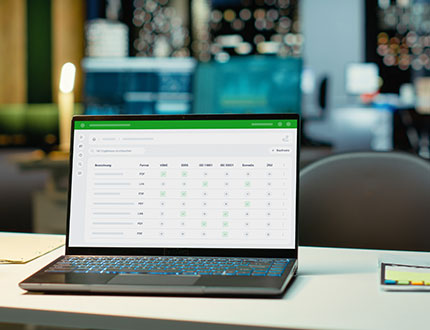Implementing CSRD Reporting Digitally and in Compliance
Software-supported, smart, and audit-proof: leadity simplifies the implementation of CSRD reporting requirements in compliance with ESRS standards.
CSRD/ESRS, GRI, DNK, SDG, and ZNU Standards
Efficient Sustainability Reporting
Whether audit-proof CSRD reports according to ESRS, GRI (Global Reporting Initiative), the German Sustainability Code (DNK), or the United Nations Sustainable Development Goals (SDGs) – cross-references between your data save you from extensive double documentation.
-
Compliant CSRD Reports through IDW PS 880 Certification: Renowned auditing confirms: leadity meets all requirements to implement ESRS standards in an audit-proof manner.
-
Central Platform for Strategy, Management, and Reporting:
Double materiality, goals & actions, KPIs, and all key ESG reporting standards in one system.
-
Efficient CSRD Reporting:
AI features, APIs, automation, project management tools, and the consolidation of data from all your locations optimise your workflow. -
leadity Simplifies Sustainability Reporting:
Guides, best practices, and data templates help you get started quickly. Individual support, Critical Reviews, and consulting available upon request.

Reporting According to the CSRD Directive
Navigation to Your CSRD Report
leadity is up to date with current legislation and science, guiding you through all necessary steps. Create your double materiality analysis, coordinate your goals and actions, measure your relevant KPIs, and continuously generate ESRS-compliant reports with AI support.
We would be happy to show you in a non-binding demo session how leadity can simplify your CSRD management.
Learn more
More Than Just CSRD Reporting
CSRD, GRI, DNK, ZNU, and SDGs: All Reports in One Central Platform
With just a few clicks, you can generate reports in leadity according to the relevant standard for your requirements or target groups. leadity links data and reporting standards and integrates external sources via upload or interface – automated for your entire corporate group.

Implement the CSRD Directive Digitally and Efficiently
leadity Guides You to a Legally Compliant ESRS Report
The leadity software offers a central platform for your double materiality analysis, goal and action coordination, as well as all relevant KPIs. Continuously generate CSRD-compliant reports and stay up to date with current legislation and science.
CSRD Software – Additional Features
All Software Features at a Glance
Advanced reporting is just one of several integrated modules of the leadity software. Whether it’s strategy, sustainability management, reporting according to ESRS/CSRD, or carbon accounting: leadity offers numerous features to make your sustainability management more efficient.
FAQs on CSRD Reporting Obligations
Questions and Answers on CSRD
If you have any further questions regarding CSRD reporting in leadity, please feel free to contact us at kontakt@leadity.de
Status: June 2025
Yes, however, in February 2025, the European Commission proposed significant amendments to the Corporate Sustainability Reporting Directive (CSRD) through the so-called Omnibus Directive. These changes aim to narrow the scope of reporting obligations and partially postpone their implementation.
Who is affected?
If the criteria proposed under the Omnibus procedure are adopted, the reporting obligation would apply only to large companies that:
- have more than 1,000 employees and …
- either generate net revenue exceeding EUR 50 million or hold total assets above EUR 25 million.
This adjustment would reduce the number of companies required to report by approximately 80%.
Postponement of reporting obligations:
- „Wave 1“ Companies: Listed companies with more than 500 employees that were already subject to reporting requirements under the German CSR Directive Implementation Act (CSR-RUG) must still report for the 2024 financial year.
- „Wave 2“ Companies: Other large companies that were initially expected to report as of 2025 will now benefit from a two-year deferral and will only be required to report in 2028 for the 2027 financial year.
- „Wave 3“ Companies: Listed SMEs will be required to report from 2029 for the 2028 financial year; however, the reporting obligation for these companies may be waived entirely.
Further changes:
- Non-EU companies: Enterprises headquartered outside the EU will only be subject to the reporting obligation if they generate more than EUR 450 million in revenue within the EU or if they own an EU-based subsidiary with revenue exceeding EUR 50 million.
The proposed amendments aim to reduce the administrative burden on companies and enhance the efficiency of sustainability reporting.
Status: June 2025
The Corporate Sustainability Reporting Directive (CSRD) will be implemented later than originally planned for many companies, following the adoption of the “Stop-the-Clock” Directive in April 2025. A final decision regarding the remaining proposed amendments is not expected before 2026.
2025:
- „Wave 1“ Companies:
Listed companies with more than 500 employees that are already subject to the Non-Financial Reporting Directive (NFRD) or the German CSR Directive Implementation Act (CSR-RUG) must report for the first time in 2025, covering the 2024 financial year in accordance with the new CSRD requirements.
2028:
- „Wave 2“ Companies:
Large companies that meet the proposed new CSRD thresholds (more than 1,000 employees and either more than EUR 50 million in revenue or more than EUR 25 million in total assets) will be required to report as of January 1, 2028. - Listed Small and Medium-Sized Enterprises (SMEs):
These companies have been granted a deferral until 2029 and may be exempted from the CSRD reporting obligation altogether. - Non-EU Companies:
Companies headquartered outside the EU will only be subject to CSRD requirements if they generate more than EUR 450 million in revenue within the EU or own an EU-based subsidiary with revenue exceeding EUR 50 million.
This phased implementation gives companies the opportunity to gradually prepare for the new reporting obligations and ensure that the necessary systems and processes are in place.
Status: June 2025
The Corporate Sustainability Reporting Directive (CSRD) requires companies to report comprehensively on their sustainability performance. The Omnibus proposal introduced in February 2025 aims to reduce the scope of reporting obligations and simplify certain requirements. Nonetheless, key areas of disclosure remain mandatory for companies and must be covered in their sustainability reports:
Environmental Aspects:
- The company’s impacts on the environment and climate
- Climate change mitigation and adaptation strategies
- Energy consumption and efficiency
- Use of water resources
- Waste management
Social and Employee Matters:
- Measures to promote gender equality
- Working conditions, including health and occupational safety
- Employee rights and social dialogue
- Compliance with labor standards and human rights across the supply chain
- Diversity and inclusion in the workplace
Governance and Corporate Management:
- Corporate governance and supervisory structures
- Business ethics and corporate integrity
- Anti-corruption and anti-bribery measures
- Internal control and risk management systems
- Independence and qualifications of management and supervisory board
Economic Sustainability:
- Business model and corporate strategy with regard to sustainability
- Sustainability-related risks and opportunities
- Sustainability targets and progress towards achieving them
- Impact of sustainability factors on financial performance and corporate strategy
Data and Performance Indicators:
- Quantitative and qualitative KPIs for measuring sustainability performance
- Comparable and consistent data to assess progress over time
- Targets and benchmarks
Supply Chain and Business Partners:
- Sustainability practices across the entire supply chain
- Monitoring and evaluation of suppliers with regard to social and environmental standards
- Collaboration with suppliers and partners to improve sustainability performance
Reporting Standards and Transparency:
- Application of recognised reporting standards such as the European Sustainability Reporting Standards (ESRS)
- Ensuring transparency and accessibility of reports for all relevant stakeholders
- External assurance and verification of sustainability disclosures
The first Omnibus package proposes a 25% reduction in the number of required data points and a suspension of additional sector-specific standards in order to ease the reporting burden on companies. Nevertheless, the core objective of the CSRD remains unchanged: to meet the increasing demands of investors, customers, and the public through transparent and credible sustainability reporting.
Nachhaltige Berichterstattung nach Standards Ihrer Wahl
Mit leadity erreichen Sie mehr als bloße CSRD Compliance
leadity integriert Reportings nach ESRS, GRI, DNK, ZNU und SDGs in einer Plattform. Mit wenigen Klicks erstellen Sie Berichte nach dem passenden Standard, verknüpfen Daten und integrieren externe Quellen. Unsere Expert:innen zeigen Ihnen gerne in einem kurzen, kostenlosen Termin, wie leadity Ihren Arbeitsalltag erleichtert.










